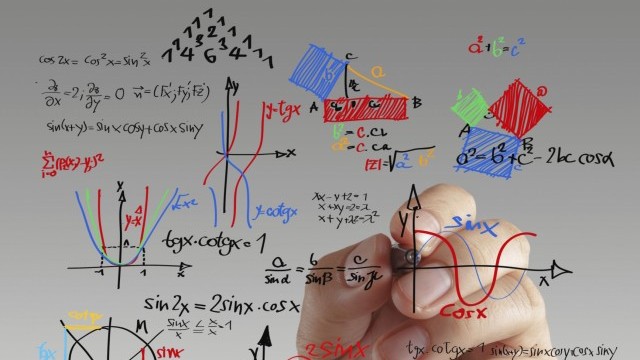About a year later, Nico joined an advanced, invitation-only math circle for a half dozen students that was led by Zeitz. "Here they all are, for two hours once a week, joyful, joyful, joyful," Brown recalled. One day in January 2013, as he watched the group animatedly discussing how many ways there are to color a cube with two colors, he turned to another student's father, Dennis Leary, and marveled: "Look at these guys, they're thrilled to be working together. Why don't we do this all day long -- and every day?"
Brown wanted to build a school for kids like his son "that they feel is really meant for them." One conversation led to another and to the birth of Proof School, with him, Leary, and Zeitz as co-founders. To jumpstart it, Brown left his job as a language-arts teacher and dean at a private school for gifted and talented youth where his son, now 13, currently attends seventh grade.
While San Francisco has several high-caliber schools, including Lowell High School, it lacks specialized science schools such as Stuyvesant High School in New York City or the North Carolina School of Science and Mathematics in Durham. But Proof School won't be like any school out there, anywhere, Zeitz said. Not only will its student body be different -- they'll all have exceptional math ability -- but so will its teachers.
At a traditional school, a teacher in a top-notch math classroom might take students on the intellectual equivalent of a strenuous hike that brings them to top of the hill. But as Zeitz put it, "what they don't realize is that they're in this incredible mountain range, which they can't see because their teacher doesn't know how to get them to put on a hang glider and jump off the cliff and see the entire topography at once." Proof School teachers will ideally have math Ph.D.s and the deep expertise to do that, he said.
As in math-circle style, the curriculum will emphasize working on and communicating about interesting math problems. Because one of Proof School's guiding principles or "axioms" is not to waste their pupils' time, the kids will be spared the unchallenging busy work or mind-numbing exercises that are common in standard schools, Zeitz said.
Afternoons Dedicated to Numbers
Every afternoon, students will spend two-and-a-half to three hours learning mathematical sciences, including computer science. Following an unconventional block curriculum structure, the academic year will be broken into six blocks of math instruction that each immerse the entire school in a single topic (such as problem solving or algebra) for five weeks straight. For each topic, kids will be placed into 10 to 12 different tiers by their skill level, Vandervelde said, which allows a lot of flexibility in meeting their individual needs.
"We'll sort kids into groups based on what they're ready for," he said, not by age or grade. Some off-the-charts precocious students will be able to take on very advanced problems at the level of the U.S.A. Mathematical Olympiad, and "we're going to be ready for them too," said Vandervelde, who, like Zeitz, competed in the International Mathematical Olympiad as a teenager. "We want to develop and nurture every one of those kids and bring them along as far as they are capable of going."
Recruiting girls to the school is a high priority, Zeitz said, noting that many young girls are enthusiastic about math but often drop out in their interest between sixth and ninth grades. "We would like to fight that trend as much as possible," he said.
Beyond numbers, the school will offer a full education, with non-math courses in English, history, languages, and science all scheduled in the mornings in a traditional grade-level manner. Proof School's teaching style will also draw upon blended learning methods that make use of technology in the classroom, as well as inquiry-based learning practices. Because classroom facility space will initially be limited, the founders plan to tap nearby educational resources: Students might go to the Exploratorium for hands-on science learning, to the Museum of the African Diaspora for history, and to TechShop for 21st century shop class.
Since some math kids are not exactly social butterflies when it comes to people skills, the school's guiding axioms also make a point of teaching students how to engage with and navigate the world around them. "We will work as hard on social-emotional intelligence and communication skills -- writing and public speaking -- as we will on anything else," Zeitz said.
Turning a Math Dream into Reality
Zeitz and his colleagues have much work ahead to make all the prime factors of their creative ideas, logistical plans, and hiring goals -- which includes finding a charismatic humanities dean who "is able to stand up to math nerds," he said -- add up to an equation for success. They're getting ready to launch an early admissions program and give "a day in the life" school preview this summer. Currently in fundraising mode, the founders hope to secure at least $1 million in order to keep the private tuition as low as possible and provide ample scholarships and financial aid.
To make the school accessible to math kids around the Bay Area, the campus will be located near public transit, most likely in San Francisco's South Financial District area. The founders also plan to share their math curriculum and resources with the world in an open-source way, which will include hosting math talks and events for the public.
Many families in Silicon Valley have expressed strong interest in Proof School, but other reactions have ranged from initial skepticism to some concerns that the school will be elitist. "We're not going to be elitist but we will be elite," Brown said. "We're not going to be snobby. We're simply taking kids who operate at this [intellectual] level and putting them together with their peers, which they haven't had in the past. And many have suffered for it."


